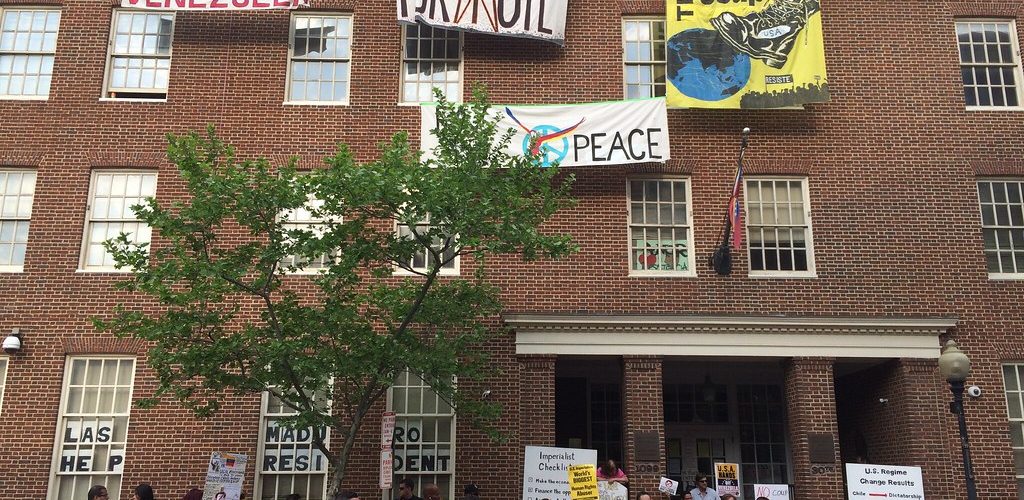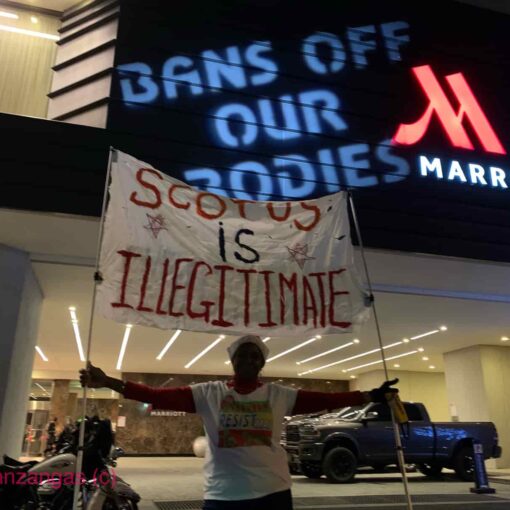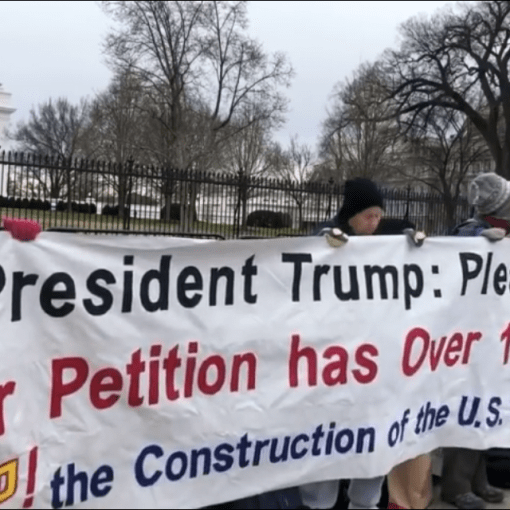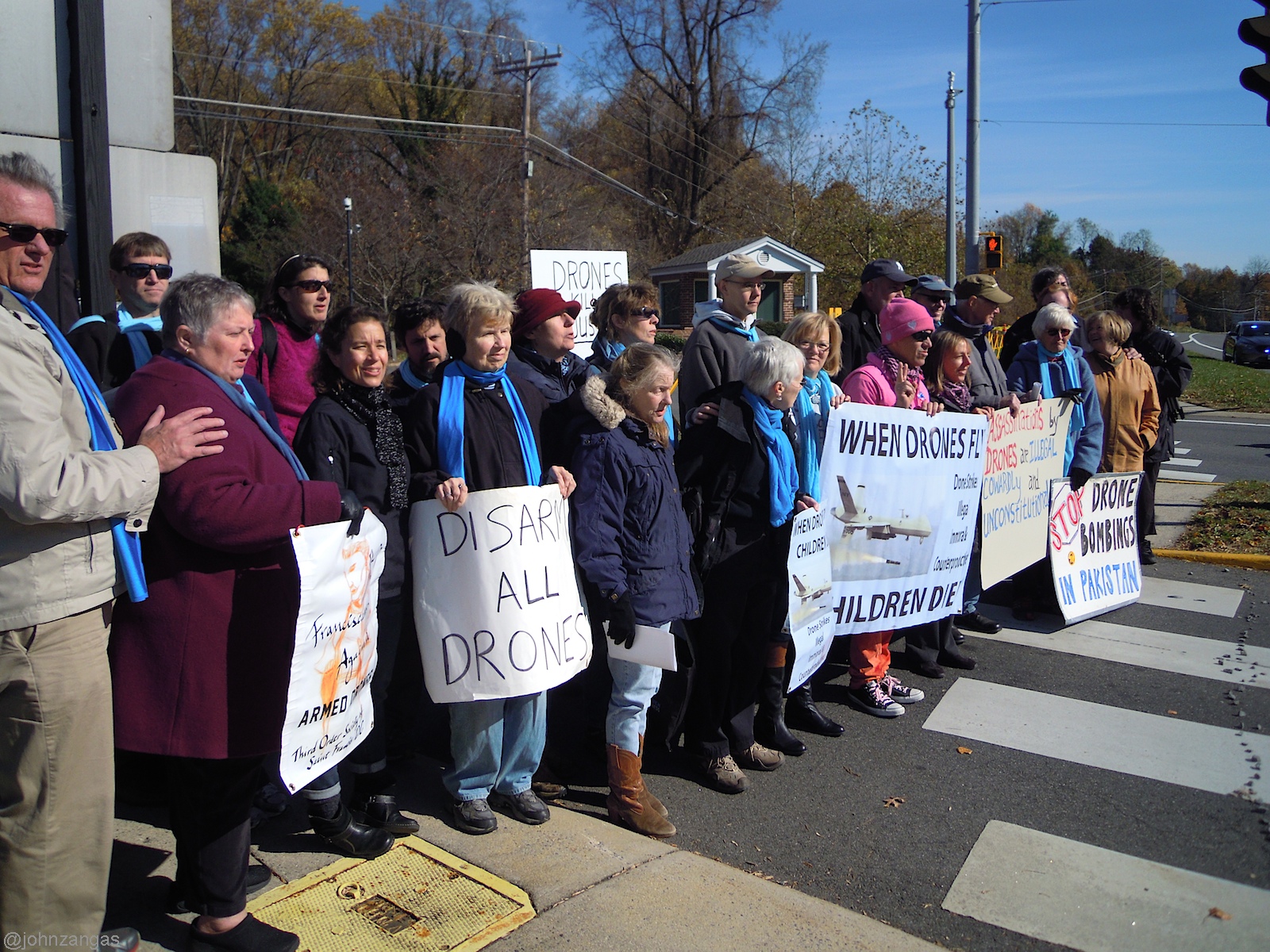Washington, DC–At ten minutes to 8 on Wednesday night, the Venezuelan Embassy Protection Collective withstood one of their most difficult days yet: they fended off another attempt of a takeover of the embassy in Georgetown by opposition forces loyal to Juan Guaidó.
They’ve remained in control of the Venezuelan Embassy, barely clinging to it by a thread. Possession of it was turned over to them when Venezuela diplomats were forced from the country last Wednesday. With it the activists have inherited a strategic centerpiece in an international political drama involving the attempted but failed coup now gripping Venezuela.
An opposition contingent sympathetic to Juan Guaidó, self-proclaimed leader of Venezuela who is attempting to overthrow Nicolás Maduro, is angry with the activists for refusing to leave the embassy. Opposition has tried to distract and penetrate Collective defenses. They’ve been blocking food and water deliveries, shouting at supporters outside the building, harassing activists at the doors and windows, pushing and bullying them when they’re outside, blasting bullhorns in their ears, and impeding their movements outside the embassy.
Protection Collective Has No More Easy Days Ahead
Many times the standoff has boiled into a battle of wits and strategy as activists blocked opposition attempts to break into the building. The opposition appears skilled at psychological techniques by distracting and bullying the activists, both on the street and from the sidewalk into the building. Their techniques and strategies are similar to military grade strategies used by psy-ops units in Iraq during the Persian Gulf War, and later, during an operation the U.S. designated Iraqi Freedom.
The Secret Service is tasked with protecting embassies in Washington, DC, but they’ve failed to act in the interests of the activists, though the activists are acting as agents for the Venezuelan diplomats, according to an attorney representing the activists. Mara Verheyden-Hilliard, Attorney of the Partnership For Civil Justice Fund, excoriated Secret Service and DC Metropolitan Police in a letter earlier Wednesday.
“Your officers are acting as aiders, abettors, encouragers, and joint tort-feasors in the assaultive, menacing, threatening and at times violent conduct against the lawfully present peace activists at the Embassy by a mob of right-wing thugs,” she wrote.
Video confirms aggressive confrontations with provocations from the opposition as they tried repeatedly to gain access to the embassy. One man successfully broke into the embassy, entering through a window and barricading himself in a room in the early morning hours on Wednesday.
Kevin Zeese, one of the organizers, negotiated an escort team of two Secret Service officers to remove the man after the man allegedly threatened to rape activists while he was barricaded inside the room. Zeese contacted the official government of Venezuela, and reached staff of President Nicolás Maduro to obtain permission for the Secret Service to enter the embassy. Once they entered, they removed the man, but did not arrest him for burglary. Activists photographed the damage he left behind. “ He completely trashed the room he was in,“ said Zeese. Photos show damaged light shields, broken furniture, and a damaged window blind.
Activists Prepared For Takeover Attempt With Nightly Meetings
Activists prepared for a takeover attempt by discussing strategies and tactics using non-violent techniques during their nightly meetings. But the Sunday night meeting triggered a security discussion and urgent building safety measures after a woman from the opposition tried to gain access during a rally.
There were over 30 activists seated around a large oak table on Sunday for the meeting which the Venezuelan Ambassador would ordinarily chair. And this meeting was no ordinary meeting such as those about oil exports, trade or American sanctions. It was about keeping the embassy from being taken and keeping it in the hands of American activists – not the opposition.
Venezuelan diplomats gave the embassy keys to the activists with permission to remain indefinitely, and with that they’ve inherited not only the building’s upkeep, but their ability to remain there. They must keep themselves safe and the building secured.
Sunday was one of the most difficult days since the Embassy Protection Collective began staying at the Venezuelan Embassy in Georgetown three weeks ago.
A woman from the Juan Guaidó opposition, was harassing the activists and tried to gain access Sunday afternoon. She was frustrated activists remained in the building and repeatedly blocked her at the doors as she tried to enter. She yelled at them for over an hour. She also attempted to barricade them inside the back entrance by tying the door with wire and chair. Her threats triggered a police response. She accused one of the activists of assaulting her. There were no arrests but nerves were rattled and activists realized a need for better security.
Margaret began Sunday’s meeting discussing embassy upkeep from a list of other topics. But the burning issue was security and lessons from the earlier incident. Activists realized keeping the embassy from being taken over by opposition loyal to Juan Guaidó would require not just living there, but stopping unauthorized entry, and balancing their will to remain there with restraint from being drawn into physical confrontations.
A Secret Service takeover remained a possibility. The opposition had already shown it would unexpectedly challenge them. Activists had many ideas on how to remain safe.
Staying at the building in close proximity with between 50 to 150 activists created its own stress. Novelty of the historic action and ownership of the embassy had long passed. This has never happened before – Americans defending a foreign embassy from a takeover supported by their own government.
There was no easy solution to security. Security would have to come from the activists themselves. Several seasoned activists had practical ideas such as rotating shifts. They realized some did not have the tenacity to be on the security team but everyone had to take a role in some way.
Organizers have chaired meetings using a general assembly process, a slow and tedious procedure, because it offered everyone equal time to weigh in on each issue raised. Discussion is painfully slow. Eight people were “on stack” at one point over the discussion of security. And until the last idea was discussed nearly an hour had passed.
Finally: the issue of whether to yield control of the front steps to the opposition was agreed on by the activists to keep presence there outside the building with rotating shifts and a banner to block the opposition, thereby not giving up any ground of the Embassy to them. A sign up sheet was passed around for the front step watch, requiring long shifts and interrupted sleep.
It was a decision that would prove to tilt the balance of preventing a takeover in their favor. By keeping a team presence on the front steps the activists forced Secret Service to put up barricades which in turn prevented opposition from breaking in and entering the building.
Meeting Topics Kept Activists Focused on Tasks
The Sunday meeting included the topic of an embedded media. Groups providing coverage were identified and welcomed. Some acknowledge they are working on documentaries. Others are tweeting, writing, live streaming, or recording video.
Each day there are speakers scheduled for educational and historic perspectives about what they do. One night an expert on a topic of military recruiting on school campus will speak about the techniques in recruiters use to attract youth for enlisting into the armed forces. But an issue is raised that all of the activists must join to support all the speakers by attending all the engagements.
One of the activists is a documentarian who has spent her life recording how movements are born, how they evolve, and what they achieve. She offers to interview anyone who is interested in a discussion of the collective.
Another activist arrived from Canada earlier Sunday when she heard online about the Embassy Protection Collective. Her husband is a political prisoner in another country and she will be giving a talk on political prisoners from her perspective.
There are activists from many states with a variety of experiences. The collective is very diverse. One of the activists asks why they haven’t made a flyer to hand out to passers-by. They agree to jump on the task and have one by the next day. Another offers that they must include the fact that Venezuela offered free heating oil to low-income DC residents some years back and that fact must be included in the flyer.
This type of action has never been tried before. It is certainly a historic action, at least in the U.S., and possibly anywhere. None of the activists has a playbook on how to do this action. None of the days are easy paint-by-number days. Things that go wrong have to be discussed later and until a consensus is reached and that takes a lot of time.
Everyone here could easily be at home relaxing and getting ready for their normal routines. One activist quit his job to join the collective. But they’ve all put their routines on hold to stop or delay an all but certain takeover attempt. If enforcement comes there will certainly be arrests. No one wants that but it’s a certainty. A constitutional attorney who spoke to them last Thursday said international law is on their side.
“We’ve done something no one expected we would be able to do. We’ve stopped the takeover for now and we are still here,” said Margaret Flowers, one of the organizers. “For a few seconds, it sinks in that this is a historic moment.”
After the meeting ended, activists began ready for the night ahead. No one knew what was to come or when a takeover attempt would happen, but they know it was certain to come.
Wednesday proved to be their most difficult day yet. The unofficial, self-appointed Ambassador Juan Vecchio tried to enter the building with over 200 supporters. But the activists were ready, and their preparations paid off. They still remain in the Venezuelan Embassy as of Wednesday night.
But tomorrow is another uneasy day and they have many more to come.






One thought on “Activists Block Attempted Takeover of Venezuelan Embassy in DC”